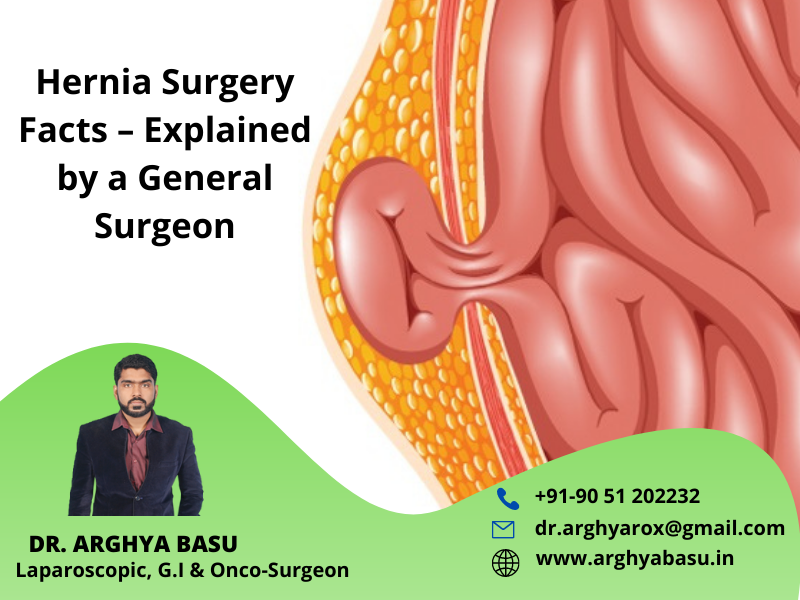Hernia Surgery Facts – Explained by a General Surgeon

A hernia develops when an organ in the body pushes through weak muscles that hold it in place. A hernia can develop in between the chest and groin. It manifests itself as an unnatural bulge. In India, the prevalence of hernia is extremely high. Hernias rarely generate severe symptoms, other from persistent recurrent pain and discomfort. A bulge or swelling can be expected.
Depending on where the hernia occurs, it might be of several types. Inguinal, umbilical, hiatus, femoral and incisional hernias are among the most common. The most prevalent type of hernia is an inguinal hernia.
In comparison to women, men are more likely to get hernias. Although hernias can affect individuals of all ages, they are more common among the elderly. Dr. Arghya Basu, a famous hernia surgery specialist in Kolkata, reveals what a hernia is and when hernia surgery is required.
Hernia Treatment
Prior to hernia treatment, a thorough examination of the condition is required. Hernias are fairly easy to diagnose. The lump (hernia) is usually visible and can even be felt. Your doctor will examine the bulge and inquire about your symptoms.
Your doctor may also recommend screening procedures like as ultrasound and CT scans to visualise the hernia’s condition.
Each patient’s hernia treatment is different. Your healthcare professional considers a number of things while deciding which treatment plan to use, including:
- Type of Hernia – Each type of hernia has a different effect on a person. As a result, its treatment is distinct.
- Hernia Content – A hernia can simply be a protrusion of fatty tissue, bowel, muscles, or other tissue.
- The Degree of Symptoms – The impact of the ailment on your daily life is evaluated to help you decide which treatment option is best for you.
- Overall Health – This is also crucial, as is your age and general well-being. If you have a chronic illness or a medical condition such as heart disease, your doctor may devise a hernia treatment plan in Kolkata for you.
If you experience mild symptoms and they do not interfere with your daily activities, your doctor may recommend active surveillance as a hernia treatment option. Changes in your symptoms will be checked on a regular basis.
Hernia Repair Surgery and Its Types
Your general surgeon will cut open the bulge and force the muscles back into their original position during hernia repair surgery. Hernia surgery is an excellent treatment option that gives long-term relief.
Traditional open hernia surgery and minimally invasive laparoscopic hernia surgery are the two options for hernia treatment.
- Open Hernia Surgery – It is a common surgical procedure for hernia repair. Your surgeon will create a big incision at the hernia’s location. He or she accesses the bulge and puts the tissues back into place through this incision. The muscular wall that is weak gets sewn back together.
- Laparoscopic Hernia Surgery – Also known as a keyhole technique, laparoscopic hernia surgery is a more advanced and revolutionary hernia surgery. Multiple small incisions are made at the hernia’s location in this procedure. The surgeon inserts a laparoscope, a narrow tube with a tiny camera attached at one end, through one of the incisions.
Conclusion
As a hernia develops, it can lead to a number of issues. So, you should not leave a hernia untreated. You can schedule an appointment with Dr. Arghya Basu, the best general and laparoscopic surgeon in Kolkata, to learn more about hernia surgery.
Read More →